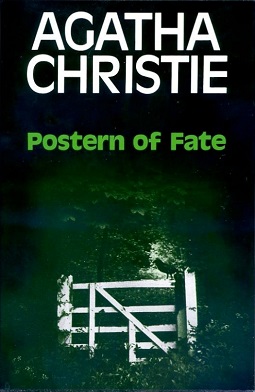Postern of Fate

Dust-jacket illustration of the first UK edition
|
|
| Author | Agatha Christie |
|---|---|
| Cover artist | Margaret Murray |
| Country | United Kingdom |
| Language | English |
| Genre | Crime novel |
| Publisher | Collins Crime Club |
|
Publication date
|
October 1973 |
| Media type | Print (hardback & paperback) |
| Pages | 256 pp (first edition, hardcover) |
| ISBN | |
| OCLC | 2736294 |
| 823/.9/12 | |
| LC Class | PZ3.C4637 Pq3 PR6005.H66 |
| Preceded by | Elephants Can Remember |
| Followed by | Poems |
Postern of Fate is a work of detective fiction by Agatha Christie that was first published in the UK by the Collins Crime Club in October 1973 and in the US by Dodd, Mead and Company later in the same year. The UK edition retailed at £2.00 and the US edition at $6.95.
The book features her detectives Tommy and Tuppence Beresford and is the detectives' last appearance. It is the last novel Christie wrote, but not the last to be published as it was followed by two previously unpublished novels from the 1940s.
It is one of only four Christie novels to have not received an adaptation of any kind (such as screen, stage or radio) and one of only five of her novels to have not received a screen adaptation - the others being Death Comes as the End, Destination Unknown, Passenger to Frankfurt, and Crooked House.
The title comes from the poem Gates of Damascus by James Elroy Flecker. The poem is also referenced in the short story The Gate of Baghdad in the 1934 collection Parker Pyne Investigates.
Now in their seventies (though the author never states their age clearly), Tommy and Tuppence move to a quiet English village, looking forward to a peaceful retirement. But, as they soon discover, their rambling old house holds secrets. Who is Mary Jordan? And why has someone left a code message in an old book about her 'unnatural' death? Once more, ingenuity and insight are called for as they are drawn into old mysteries and new dangers.
Most critics remarked how noticeable Christie's advanced age is here. For example, the main characters Tommy and Tuppence, also of advanced age, seem to forget in one chapter what they discussed in the previous chapter. Some conversations seem to be repeated again and again, before any action takes place. Some puzzles which are obvious and easy to solve for the reader take chapters to be tackled by the main characters.
...
Wikipedia
